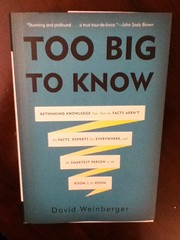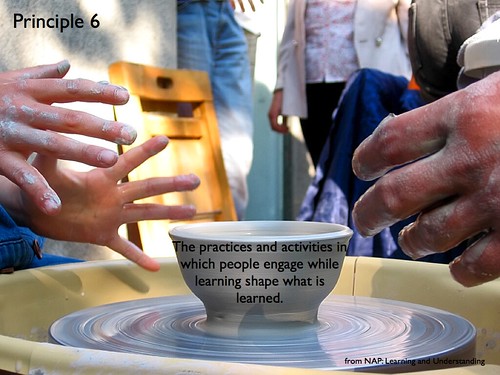 Image by dkuropatwaHow'd you like to know "how our concept of knowledge is changing in the age of the Net"? (John Seely Brown quoted from the dust jacket)
Image by dkuropatwaHow'd you like to know "how our concept of knowledge is changing in the age of the Net"? (John Seely Brown quoted from the dust jacket)Since I first heard David Weinberger say: "The smartest person in the room is: The Room!" I've repeated it often. I've seen it in action. In his new book Too Big To Know he fills in a few more details about this. The room is "smartest" as a function of the networked connections between all the people in it, and out of it, via the internet. I hear echoes of George Seimens and Stephen Downes in that.
Anyway, the book was published on 3 January 2012 and I just got my copy of it today. In the last 10 days or so the idea of an #edbookclub flared up on twitter. So, we're going to do that. We begin this Friday. We've even got a timeline and a list of people reading together. The conversations have beginning times, to help us all stay on track, but they don't have ending times. So really, join in any time you like.
#edbookclub originally grew out of a conversation between Ben Hazzard and Kelly Power. They describe it:
What is it? #EdBookClub emerged from a discussion between educators (@kellypower and @benhazzard) about how using Twitter could encourage professional dialogue. It will be a discussion about a common book or article, that is voted on via a TwitPoll, by educators and people interested in applying the book's content in an education setting.
Why? The purpose of this Twitter discussion is to engage in an informed discussion on Twitter that also provides a purpose and audience for educator tweets. This was informed by #educhat when the organizers in 2008/2009 began posting articles and other documents to heighten the conversation.
How?
- Participate:
- Read the book or article with us (or listen via the audio version). Follow the #EdBookClub 'hashtag' on Twitter to find out new information. Then send messages via Twitter with the #EdBookClub 'hashtag' to offer your ideas, questions, and comments.
- Respond to #EdBookClub tweets to extend, clarify or question to enhance our collective learning
- Follow along: Read all the #EdBookClub tweets by following that 'hashtag'
If you'd like to join us message me on twitter @dkuropatwa and let me know. Get a copy of the book; it's only available in either hardcover or kindle format right now. As you read, tweet reflections and quotes from the book that strike you. Use and follow the hashtags #edbookclub and #2b2k. There's already been some talk about chatting in realtime in a Google+ Hangout or maybe in an eluminate room.
Anyone want to take turns building a storify each week?
- 1/24/2012 11:10:00 pm
- 7 Comments







